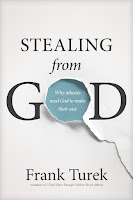Introduction
Over the years Dr. Norman Geisler has had a profound effect on the way that I think philosophically and theologically. Through his defenses of the Christian worldview (the essentials and nonessentials) in his numerous books and lectures I have been better equipped analyze views, defend the Gospel, and "worship the Father in spirit and in truth" (John 4)
One of the early books that set my path to being able to logically evaluate arguments was "
Come, Let Us Reason" (click or tap the title for my full chapter-by-chapter review). In the book, he provides Christians with an introduction to logical thinking that will help them in identifying false claims (that may sound correct on the surface) and in defending true claims. I have compiled a few of my favorite quotes from that excellent book in this post. If you have not picked up a copy yet, I highly recommend that you do.
Why Do Christians Need Logic?- Logic and God
"Logic is a way to think so that we can come to correct conclusions by understanding implications and the mistakes people often make in thinking."
"From the standpoint of reality, we understand that God is the basis of all logic. As the ultimate reality, all truth is ultimately found in him. He has created the reality that we know and in which we have discovered the laws of logic. Even Jesus said, 'I am...the truth' (John 14:6). He has structured the world in such a way that these laws cannot be denied; however, we did not know God first and then learn logic from him. He exists as the basis of all logic (in reality), but we discovered logic first and came to know God through it. This is true even if we came to know God through his revelation, because we understand the revelation through logic. In the order of being. God is first; but in the order of knowing, logic leads us to all knowledge of God. God is the basis of all logic (in the order of being), but logic is the basis of all knowledge of God (in the order of knowing)."

"We use logic in the process of knowing God, but that does not mean that God came after logic in reality. without God, nothing could have existence. God is the basis of all logic in reality and he is in no way inferior to logic. Logic comes from God, not God from logic. But when it comes to how we know things, logic is the basis of all thought, and it must come before any thought about anything, including God. For example, I need a map before I can get to Washington, D.C. But Washington must exist before the map can help me get there. Even so, we use logic first to come to know God, but God exists first before we can know him."
"Unless valid inferences can be made from what is known to what is unknown, there can be no theological argumentation. Whether in a discussion between Christians on a matter of interpretation or in a debate with a non-Christian, no one could prove any point without the laws of rational inference."
How Do You Think Correctly?- Using Logic
"Using syllogisms is called deductive logic because it involves deducing particular conclusions from general statements. In inductive logic, we start with the particulars and reason to general principles. Deductive logic starts with the cause and reasons to the effect, while inductive logic starts with the effects and attempts to find the cause. That is why deductive reasoning is called a prior (prior to looking at the facts) and inductive reasoning is called a posteriori (after seeing the evidence). Syllogisms are more philosophical, and inductive arguments are more scientific. The biggest difference, though, is that deductive arguments yield necessary conclusions (that is, the conclusions are necessarily true if the premises are true and the inferences are valid), but inductive reasoning yields only probable conclusions. The conclusions might have a high degree of probability, but they are still not as certain as deductive conclusions."
"You may not know what the significance of some piece of information is, but you must note it in case it becomes important later. Even the smallest clue may change the whole direction of your understanding."
"Analogies can be used to present very strong and effective arguments, but analogies are good only when there are strong similarities and only nonessential differences between the things being compared."
How Can Thinking Go Wrong?- Fallacies In Logic
"Whenever there is controversy over an issue, the appeal to authority is weakened in direct proportion to the strength of the controversy...All appeals to authority ultimately rest on the evidence that the authority has. The only reason to quote an authority is that he knows the evidence better than we do. The letters after his name don't mean a thing without the evidence to back up his position."
"[Special pleading] is [a] way to make certain the opposing view doesn't get a fair shake. Here only the evidence that supports one view is cited, and the rest is left out...If there are ten studies that show your view to be false, ignore them and make a big point about the one that confirms your conclusion. Really, this argument counts on the listener to be ignorant of the facts. That way anything can be claimed, and no objection can be raised. However, if someone knows about the other ten studies, you're in trouble. This kind of argument can be torn apart easily if all the facts are made known."
"[No] view should be accepted on the basis of ignorance. That is no way to find truth! Let positive evidence be presented and evaluated for both sides, and the truth can be known...If a conclusion is false, it is only a matter of finding the fallacy or the untrue premises (or both)."
For more great quotes from Dr. Geisler on various other topics, see these posts:
Here are my chapter-by-chapter reviews of other books he (co)authored:





![Quote from "Come Let Us Reason" by Norman Geisler: "[Special pleading] is [a] way to make certain the opposing view doesn't get a fair shake. Here only the evidence that supports one view is cited, and the rest is left out...If there are ten studies that show your view to be false, ignore them and make a big point about the one that confirms your conclusion. Really, this argument counts on the listener to be ignorant of the facts. That way anything can be claimed, and no objection can be raised. However, if someone knows about the other ten studies, you're in trouble. This kind of argument can be torn apart easily if all the facts are made known." #Logic #Fallacy #SpecialPleading #Philosophy #Reason Quote from "Come Let Us Reason" by Norman Geisler: "[Special pleading] is [a] way to make certain the opposing view doesn't get a fair shake. Here only the evidence that supports one view is cited, and the rest is left out...If there are ten studies that show your view to be false, ignore them and make a big point about the one that confirms your conclusion. Really, this argument counts on the listener to be ignorant of the facts. That way anything can be claimed, and no objection can be raised. However, if someone knows about the other ten studies, you're in trouble. This kind of argument can be torn apart easily if all the facts are made known." #Logic #Fallacy #SpecialPleading #Philosophy #Reason](https://blogger.googleusercontent.com/img/b/R29vZ2xl/AVvXsEjqjNyDPE3Q3H2-32IpuOxEDs2UTMMc-AMqNDZtwENCjZ4nojFWFPf0X4L-yZmnT5JTNggeJIXpb_HjvOhNe_tDgJ6z8TMAy2-zzSjy1rSxD82jsPpQYCCjvt2m2_soE5jLvCFfVM2nVOQ/s640/Slide13.JPG)












